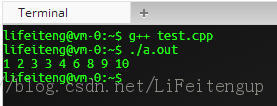Effective C++笔记之二const_and_non-const 修饰的成员函数
1.对于const修饰的成员函数分为两种观点: logic constness and bitwise constness.
bitwise constness 的观点就是说 :“它不更改对象的任一bit”, 这样一来 , 编译器只要成员变量有赋值的行为即可,这是对只读性的定义,因此,const 成员函数不可以更改对象中任一non- static 成员变量。
eg1:
class TextBlock
{
public:
............
char& operator [] (std::size_t position) ;
const char& operator [] (std::size_t position) const ;
private:
std::string text ;
} ;
TextBlock bt("Jack") ;
std::cout<<bt[0] ; //true , read a non-const TextBlock
bt[0] = 'T' ; //true , write a non-const TextBlock
const TextBlock cbt("Rose") ;
std::cout<<cbt[0] ; //true , read a const TextBlock
cbt[0] = 'L' ; //false , cannot write a const TextBlock !!
char *ptr = &ctb[0] ;
*ptr = 'T' ; //true , not change the adress of ctb[0] , but the content has changed!!
而logical constness的观点是可以改变对象内的某些bits ,例如eg1中的*ptr = 'T' ; 这样还是让ctb中的pText 值改变了!!
若类的常成员函数有non-const 数据成员,并且要进行赋值操作, 那只能用mutable 来修饰non-const 数据成员了
eg2:
class TextBlock
{
public:
TextBlock(char * str = "\0" ) : pText(str) , textLength(0) , lengthIsValid(false)
{}
std::size_t length() const ;
private:
std::size_t textLength ;
bool lengthIsValid ;
} ;
std::size_t TextBlock::length() const
{
if(!lengthIsValid)
{
textLength = std::strlen(pText) ;
lengthIsValid = true ;
}
return textLength ;
}
2.在const 与non-const 成员函数避免重复,这时候需要进行解除const的只读性和加上const 的只读性。
eg3:
class TextBlock
{
public:
TextBlock(string name = "\0") ;
const char& operator [] (std::size_t position ) const ; //常成员函数
char& operator [](std::size_t position) ; //普通成员函数
private:
std::string m_Name ;
} ;
TextBlock::TextBlock(string name):m_Name(name)
{}
const char& TextBlock::operator [] (std::size_t position) const
{
if(position >= m_Name.length() || position < 0) //边界检查
{
throw 0 ; //抛出异常
}
else
{
return m_Name[position] ;
}
}
//利用普通成员函数去调用常成员函数
char& TextBlock::operator[] (std::size_t position)
{
//static_cast<const TextBlock&>类型转换非常对象变成常对象,以此调用常成员函数
//cosnt_cast是把常operator[]的返回常量去掉
//若不这样进行两次转换,会出现无限的递归调用non-const operator[] 函数
return const_cast<char&>(static_cast<const TextBlock&>(*this)[position]) ;
} www.zzzyk.com
补充:软件开发 , C++ ,




